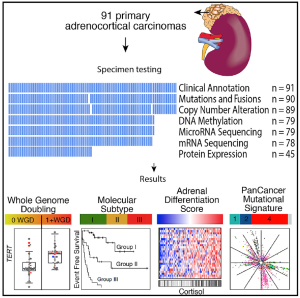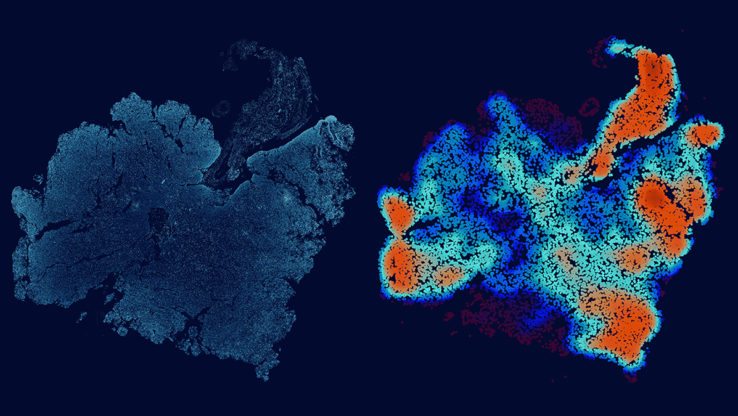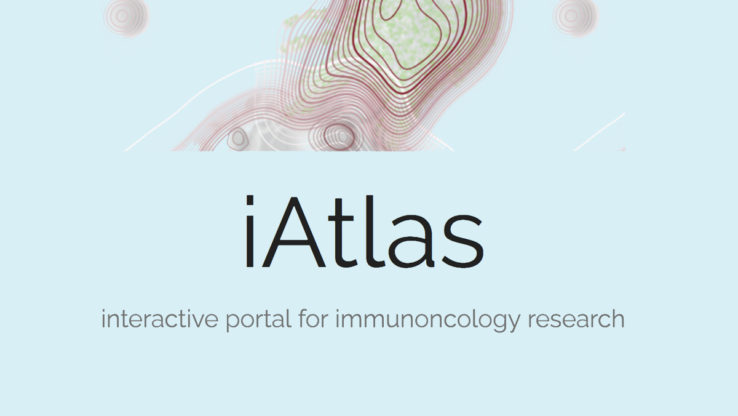May 23, 2016
3 Bullets:
- Adrenocortical carcinoma (ACC) is a rare, under-researched endocrine cancer with limited therapeutic options and overall poor outcome.
- TCGA researchers performed comprehensive analysis of 91 ACC samples to gain better understanding of potential genetic causes of the cancer.
- Researchers revealed whole genome doubling as a milestone in disease progression and discovered a potential biomarker that is based on DNA methylation that may inform ACC drug therapies.
By Varsha Dhankani
Adrenocortical carcinoma (ACC) is a rare endocrine cancer with limited therapeutic options and overall poor outcome. In TCGA (The Cancer Genome Atlas) research published on May 9, 2016, in the journal Cancer Cell, scientists, including several from Institute for Systems Biology, comprehensively analyzed 91 ACC specimens from four continents using state-of-the-art genomic technologies and computational methods. The goal of the study was to identify additional oncogenic alterations to provide a framework for further research and guide development of therapies.

Graphical abstract for the article “Comprehensive Pan-Genomic Characterization of Adrenocortical Carcinoma” in Cancer Cell.
While stage I and II tumors are organ-confined and potentially curable, advanced-stage tumors are invasive and/or metastatic, with a dismal five-year survival for stage IV patients. ACC pathogenesis is not completely understood by the scientific community, and there is need for additional therapeutic avenues.
Analysis of clinical data revealed that cortisol hypersecretion and patient stage at diagnosis were predictive for both overall survival and disease-free survival, but age was only associated with overall survival. Gender had no clear association with disease stage or clinical outcome.
Scientists observed frequent occurrence of massive DNA loss followed by whole-genome doubling (WGD) to be associated with aggressive clinical course, suggesting that WGD is a marker for ACC progression. Additionally, they were also able to expand the catalogue of known ACC driver genes and pathways, potentially expanding the catalogue of actionable targets for therapy.
The study also made a potentially significant contribution by defining a 68-CpG probe DNA-methylation signature that captures three prognostic molecular subtypes of ACC, proposing a strategy for clinical stratification of patients based on molecular markers.
The dataset analysxd here is standardized with other Cancer Genome Atlas (TCGA) studies, and is fully available at the TCGA Data Portal to serve as a valuable research resource.
Title: Comprehensive Pan-Genomic Characterization of Adrenocortical Carcinoma
Journal: Cancer Cell
Authors: Siyuan Zheng, Andrew D. Cherniack, Ninad Dewal, Richard A. Moffitt, Ludmila Danilova, Bradley A. Murray, Antonio M. Lerario, Tobias Else, Theo A. Knijnenburg, Giovanni Ciriello, Seungchan Kim, Guillaume Assie, Olena Morozova, Rehan Akbani, Juliann Shih, Katherine A. Hoadley, Toni K. Choueiri, Jens Waldmann, Ozgur Mete, A. Gordon Robertson, Hsin-Ta Wu, Benjamin J. Raphael, Lina Shao, Matthew Meyerson, Michael J. Demeure, Felix Beuschlein, Anthony J. Gill, Stan B. Sidhu, Madson Q. Almeida, Maria C.B.V. Fragoso, Leslie M. Cope, Electron Kebebew, Mouhammed A. Habra, Timothy G. Whitsett, Kimberly J. Bussey, William E. Rainey, Sylvia L. Asa, Jérôme Bertherat, Martin Fassnacht, David A. Wheeler, The Cancer Genome Atlas Research Network, Gary D. Hammer, Thomas J. Giordano, Roel G.W. Verhaak



 isbscience.org/research/integrative-study-rare-adrenocortical-carcinoma-reveals-prognostic-molecular-subtypes/
isbscience.org/research/integrative-study-rare-adrenocortical-carcinoma-reveals-prognostic-molecular-subtypes/








